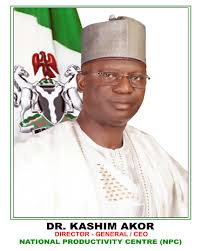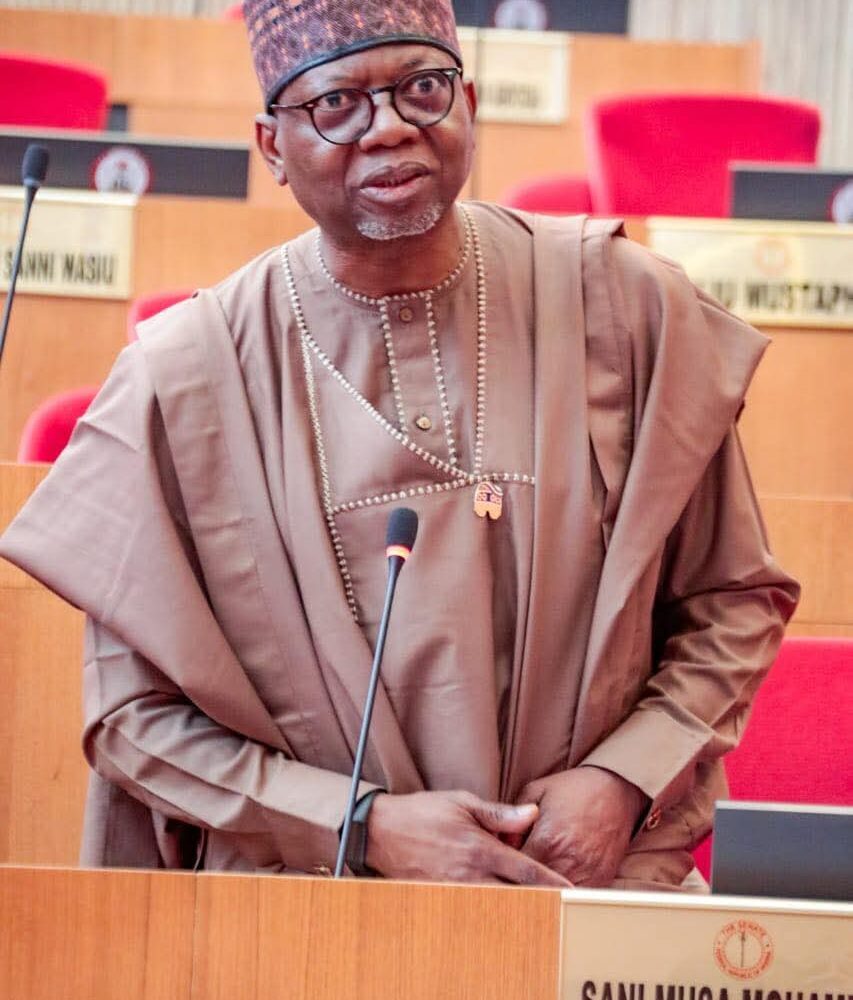It was another opportunity for the leadership of the National Productivity Centre NPC to showcase its efforts towards reiterating more efforts with a view to configuring the psyche of a productive society, through efforts to think productivity for economic growth and development in Nigeria.
Therefore, the 6th day foundation lecture held on 29th, November, 2021 at Nigerian National Merit Award House in Abuja with the presence of Who’s is Who in the country, that thrown their weight behind the auspicious occasion.
The yearly event declared open by the Minister of Labour and Employment, Senator Dr Chris Nwabueze Ngige , including the Minister of state, Labour and Employment, Festus Keyamo, the Permanent Secretary in the Ministry, and the Chairman Governing Council of NPC, Eyo NSA Ekpo, while the guest speaker, the Senior Special Assistant to the President on National Social Investment Program NSIP who also presented papers at the occasion aimed at galvanising productivity in all spheres in Nigeria.
The theme of the foundation day lecture tagged , “Productivity Paradox; Creating The Pathway of Growth and Development” was coming at a time when Nigeria is going through the unabated global health emergency of COVID that led to total lockdown, both at its Delta variant, waves amidst administration of series of products of vaccines by the National Primary Health Care Development Agency NPHCDA piloted by the Federal Ministry of Health In Nigeria.
It was also coinciding with other variables like recurring world economic recession , unemployment rates , job losses, insecurity, economic hardship and climate change that had occasioned the need to think productivity in all ramifications.
The yearly event which attracted many speakers for the 2022 program, included many lecturers that spoke extensively on the burning issue and topic for the occasion.
Labour and Employment Minister, who was represented by the Permanent Secretary of the ministry used he occasion to reel out various development plans stating that the essence and advantages associated with productivity is the enhancement of national productivity levels, as well as celebrate productivity movement in Nigeria that was dated back to 1978.
According to the Minster, the occasion had further giving the sole aim to educate Nigerians on the productivity movements across the world visa vis the Nigeria experience, as well as stimulate a national discourse , hence the need for Nigerians to develop a productive mindset across all sectors and works of life.
The Labour and Employment Minister, while referring to the topic, reeled out the history of the National development plans in Nigeria in the last six decades spanned from 1962-1968, 1970-1974, during the civil war, 1975-1980 during the oil boom, with 1981-1985 heralded the economic policy of Structural Adjustment Program (SAP) of Babangida’s military administration.
In 1990- 2003, there was the National Economic Empowerment Development Strategy, NEEDS, 2003-2007 of President Obasanjo’s administration alongside SEEDS and LEEDS with vision 20:2020.
Others are the seven point agenda (7) of President Yar’Adua’s term, Transformation agenda 2011-2015 of President Jonathan, the Economic Recovery and Growth Plan(ERGP), 2017-2020 of the current administration of President Muhammadu Buhari down to the immediate Medium Term National Development Plan (MTNDP) 2021-2025, stating that to close the gaps and plans for a successful productivity environment, the need to mainstream productivity to every plans that would guarantee growth and development is non negotiable.
He said the essence of measurement of thriving economic environment and development remained productivity, hence effective and efficient utilisation of available resources at one’s disposal to the overall well-being of Nigerians and her citizens revolved around productivity improvement drives.
Therefore, Ministries , Departments and Agencies of governments inline with the clamour of the National Productivity Centre NPC was committed to creation of jobs/employment opportunities, social security, occupational safety, industrial peace based on collective bargaining leading to enhancement of productivity across all sectors of the economy.
He commended the roles of National Productivity Organisation (NPO) for its adjustment to the current realities, said the National Productivity Centre NPC had adjusted in that regard, as it continues its strides towards part of improvement.
“Building an economically viable nation requires attitudinal changes and behaviourial modifications by all of us being pioneered by NPC in Nigeria to achieve a chunk part of productivity.”
The existence of NPC in Nigeria was in line with the strategic move to improve the competitiveness and economic strength of Nigeria, hence the huge expectations of government and Nigerians cannot be overstated.”
It therefore, behoves on government the need not only improved the capacity building, review National Policy on Productivity, NPP, fund core programs of the centre such as the foundation day, and National Productivity Order of Merit Award, already carried out in the current dispensation.
Senator Ngige underscored the need to play crucial roles in macro-economic and structural changes, aid technological changes adaptation, invest more in research and development, improved infrastructure, education, training needed for improvement in national level of productivity.
The Director General of the centre, Dr Kashim Akor who was the chief host of the occasion hinged his address on 20 key points of impacting productivity on the citizenry, stating that, the convening of NPC through Decree 7 , 1987 and now NPC Act (CAP) 70 of 2004, stated that aside history , the need to improve productivity, its benefits and growth, development and competitiveness both locally and globally.
He presented in his paper, that the core mandate of the the centre is centred on stimulating productivity consciousness, determining productivity levels, monitoring productivity trends, promoting and leading productivity movement in the country towards attainment of higher level productivity in all sectors of the economy, with the aim of enhancing the living standards of the people, said the centre had pursued the mandate vigorously.
He mentioned some key interventions to including developing productivity mindset and institutionalising productivity culture in the citizenry, through productivity awareness campaign (PAC), advocacy and capacity building.
Research in strategic productivity area for enhancing productivity, competitiveness and economic growth, promoting human resource development for building a knowledge – based society through productivity and promotion of organisational excellence, best practices to enhance profitability and growth through the installation of productivity and quality improvement programs (P and QIP.)
Others are promoting the application, adoption of cutting -edge productivity improvement techniques and tools for productivity enhancement, Annual productivity statistics, containing sectoral productivity indices, to guide national planning , private sector investment among others.strengthening SME’s through productivity and quality investment and Networking and partnering NPO’s institutions locally and globally for a nationally focused development.
Inspite the consequences of the global pandemic, the unrelenting management of the centre had recorded some success stories , beginning with Development of strategic plans spanned for two five-year strategic plans were drawn in the last six years, with the second one from 2016-2020, 2021-2025, this is to provide framework, redefining the overall strategy for the centre, refocus its programs and it’s activities as well as realigning it’s resources for optimal performance.
Productivity and quality improvement programs (P and QIP) is a quality improvement program designed to positively affect changes in organisations, it identifies problems and profer solutions, jointly implemented by the centre and affected organisation staff.
Six years after, twenty organisations had benefitted, as the program had boosted their profitability, competitiveness and improved productivity.
Thirdly, productivity index guide investment decisions and policy planning, with the centre’s datas continuously updated to meeting current trend, with labour productivity 2010-2016 produced and published, 2017, 2018, were rolled out, except 4th quarter, computation of Labour productivity statistics for seven years 2012-2019 was carried out, including survey on citizens satisfaction on conducts and services provided by NRC among other sectors in collaboration with NBS.
Meeting with the core objectives of Economic Recovery and Growth Plan (ERGP) of government through ‘investing in our people’ a number of capacity building programs, comprising in plant trainings, Seminars , workshops were hosted.
Capacity building workshops in accordance with COVID requirements through webinar, zoom presentations which enabled continuity despite the challenges.
The centre also developed productivity awareness within six years to instill public servants the culture of productivity in MDA’s, collaborate MDA’s through HOS office, for a weekly lectures on Productivity to MDA’s and followed to the later.
The centre has sensitised over 200 MDA’s both within and at the states across Nigeria ,as the lectures are ongoing and been received with enthusiasm by public workers.
A robust productivity awareness creation framework using integrated marketing communication that involved all media of communication was put in place.
It included jingles, in major languages and pidgin periodically on Radio and TV, talkshows, interviews, spotlights and documentaries.
Coaching and mentoring was also adopted to catch them young through schools program. Basically designed for secondary schools meant to inculcate productivity culture early in their lives. This is done through the instruments of formation of productivity clubs, academic Quiz competition, and lectures on productivity tools and techniques, as the centre had garnered 67 of such clubs across the country.
The NYSC is not also left out in the scheme of things to enhance productivity, hence lectures on productivity, tools and equipments and techniques are delivered at orientation camps of NYSC.
Research and surveys are ongoing on several areas aimed to build and promote performance based culture in Nigeria public service, assist government in taking decision to ensure service enhancement, monitoring, budgeting, performance assessment, evaluating the impact of infrastructure and SME’s in Nigeria.
This is geared towards socioeconomic growth and the centre’s mandate through productivity improvement as materials from such exercise are circulated and disseminated to various stakeholders in the economy.
Observation of the National Productivity Day (NPD) meant to sensitive citizenry and deserving productive Nigerians and organisations, it had being successfully held in 2015, 2017, 2018 and 2019.
It was celebrated nationwide, with award lectures, exhibition of made in Nigeria products and conferement of the National Productivity Order of Merit by the President and State Governors at state levels.
66 Nigerians had been conferred of recent between 2015-2019, 19 organisations, 2018, 2019 edition was personally confered by President Muhammadu Buhari GCFR, with a warm reception at the Villa for 2019 recipients.
Other achievements are strategic partnership with NPO’s, international Development partners, to build capacity and facilitate economic growth.
The organisations are Japan productivity centre, Asian productivity organisation, Pan African Productivity Association PAPA, Malaysia Productivity Corporation, Productivity South Africa among many others.
The centre had trained many staffs as international consultants, with no cost to Nigerian government, the officers had impacted relevant knowledges in MSMEs and capacity building.
Staff trainings for members of staff of NPC is a recurring and routine activities, including the inception of National productivity quality training, which came into being in 2017, with the assistance of UNIDO, to ensure improved quality of made in Nigeria products, trainings and awareness.
With international recognition and accreditation by the chartered quality institute CQI, International Register Certificate Auditors IRCA of UK June 2018, and currently developing a curriculum for training of students of corporate bodies, for certification by the international organisation for standardisation (ISO) management in its system service consisting of :
Quality Management System( 1SO 9001-2015)
Environmental Management System (ISO 14001;2015) and Food Safety Management System ( ISO 2200;2005).
The centre generated funds through fees, training programmes and productivity improvement techniques. It recently won an award of excellence by the UNIDO under its Nigeria National Quality Award Scheme.
The centre having trained over 1,200 productivity practitioners had prepared them for future challenges both at Ministries, Departments and Agencies as well as principals of secondary schools in Kogi State.
With Nigeria productivity journal with its maiden edition published in 2017, was geared towards distributing productivity knowledge, along a number of publication rolled out to justify the mandate of the centre towards institutionalising productivity knowledge in the psyche of Nigerians, within the period under review along with 16 publications.
Staff welfare, promotion as at when due to motivate them for higher productivity had been at the front burner, and also exposed to various short term courses and programs.
The centre established state offices to bring its operations to the door steps of many Nigerians, Lokoja and Porthacourt came on stream bringing state offices to (14), while Osogbo, Osun State will follow soon.
The leadership of the centre built inter- personal relationship and team work to move the activities of the centre forward, there by ensuring industrial peace and harmony, as the DG NPC , Dr Kashim Akor was rewarded with the giant strides by an award from the staffs of the centre in 2017.
The centre acquired four vehicles in less than three years,with necessary working tools, computers, printers, internet services to enhance the productivity of workers. Another new set of vehicles was recently acquired .
Under the leadership of Dr Kashim Akor, the current Director General/CEO, National Productivity Centre NPC, relationship between the centre ,the public and private organisations had blossomed beyond imagination including the formal sector.
NPC is now an active member of NASME, NACCIMA, and NECA. The centre also partner with National Salaries, Incomes and Wages Commission to provide input in the determination of National Minimum Wage.
It’s representation in international organisations had been unwavering and rewarding, as recently the Director General who was representing Nigeria was elected on the Board of Pan African Productivity Association (PAPA), as well as African Regional Labour Administration Centre (ARLAC), with letter of commendation issued to the DG NPC.
Above all, the commendation and good wishes, the desire to consolidate the above success programs of the DG NPC, that will make productivity not only a house hold word in Nigeria, but a hub of both social and economic security of all Nigerians.
This will carried out through more commitment and determination to continue to achieve result oriented programs and policies, that will continue to serve as a model in the realisation of set objectives towards the attainment of higher levels of productivity in all sectors of Nigeria economy, and promoting international cooperation and recognition for enhancement of National Productivity.
With the giant performance and achievements, no doubt the 2021, 6th Foundation Day Lecture of the National Productivity Centre NPC, under an erudite scholar, Dr Kashim Akor was a worthwhile and desiring continuity.
Yusuf Writes From Abuja, All inquiries to yus.abubakar3@gmail.com.





